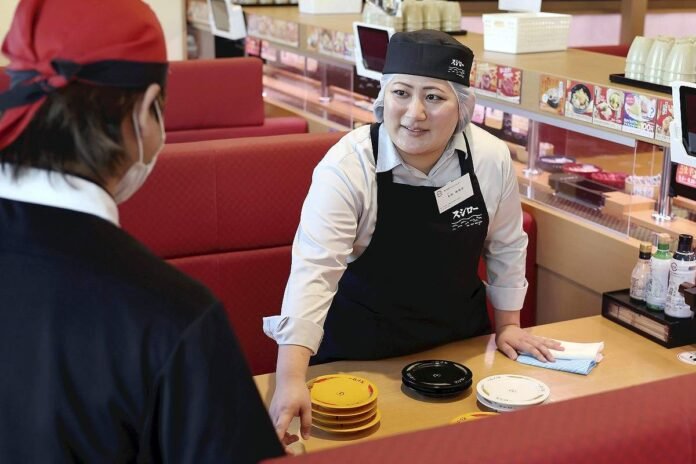The manager of the Jimokuji branch of the sushi chain Sushiro is pictured in Aichi Prefecture in September.
17:26 JST, October 5, 2024
As competition to recruit young workers increases amid Japan’s labor shortage, companies have expanded opportunities for high school graduates, including appointing them to leadership positions from an early age.
The ratio of job openings to the number of high school students graduating in the spring is expected to reach a record high.
Applications from high school students graduating in 2025 were officially accepted in July, while interviews and other phases of the selection processes have been underway since September.
The Ministry of Health, Labor and Welfare announced in September that the ratio of vacancies to applicants had reached a record high of 3.70 to 1 at the end of July. The number of vacancies at large companies – companies with 1,000 or more employees – increased by 6.4% year on year, the highest rate of increase ever recorded, the ministry said.
“Due to the labor shortage, it is becoming more difficult to recruit university graduates, and the average age of the workforce is increasing,” said an official from an Osaka-based recruitment agency, Jinjib Co.
“Workers who start their careers after graduating high school have more years to contribute to their workplace in their 20s. The demand for those types of workers is growing, especially in the service and manufacturing industries,” the official said.
A 23-year-old manager of a Sushiro’s Jimokuji branch in Ama, Aichi Prefecture, started her career after graduating from high school in the spring of 2020.
She worked part-time at the conveyor belt sushi franchise when she was in her freshman year of high school. “I liked the atmosphere of the workplace because everyone worked together as one, and I wanted to move there full-time quickly,” she said of when she applied for the full-time position.
In addition to the store, she worked at the Sushiro stall at the Dubai Expo in 2021, gaining further experience there and was promoted to branch manager in September 2022 at the age of 21. At the Jimokuji branch, where she holds her third manager position, she leads a team of approximately 80 employees, from high school students to people in their sixties.
“She is so much younger than me that she could be my child, but she has a lot of experience and gives good instructions,” says a 46-year-old part-time worker.
The average annual income of a Sushiro branch manager is ¥6.21 million. There are about 650 Sushiro branches nationwide and about 20% of the managers are in their 20s.
“Academic background plays no role in our hiring process, and there is no difference in wages or promotions between high school seniors and college graduates. High school graduates can be promoted at a young age because of their longer work experience,” said an official from Sushiro’s parent company, Food & Life Companies Ltd.
Runa Suzuki, 21, works for Mercury Inc., an HR services company in Tokyo. She took on a leadership role in April, two years after joining the company, supervising eight sales associates at a consumer electronics store in Aichi Prefecture, which she did after graduating from high school.
Seven of her company’s eight employees are university graduates. However, she says she has never been treated as someone who is incapable just because she has a high school diploma. “It is a job that suits my temperament because I am judged on my results,” she says.
In most prefectures, agreements have been made between the education council and local economic organizations on job search for high school students.
The current practice is to limit students to only one company at a time. On the one hand, the practice speeds up the recruitment and job search process. On the other hand, the 37% job turnover rate within three years of graduation in 2020 would also be a result of practice.
“The current job search system is inadequate because it does not allow students to compare and choose companies,” said Shoto Furuya, a researcher at the Recruit Works Institute. “Schools must offer career education that involves local businesses. If companies also want diversity in the workplace, they need a human resources development system in which treatment and promotion are not based solely on academic background.”



